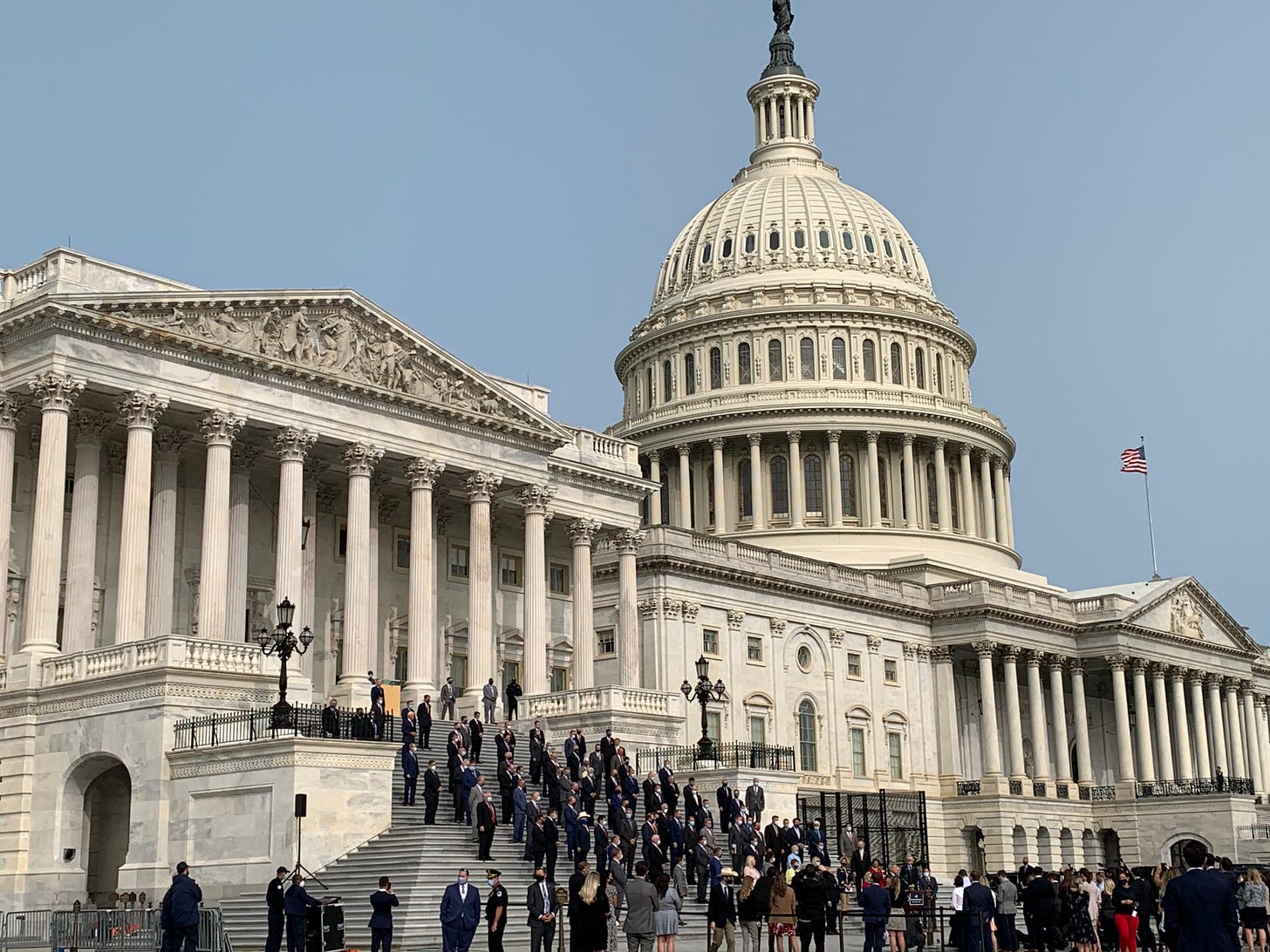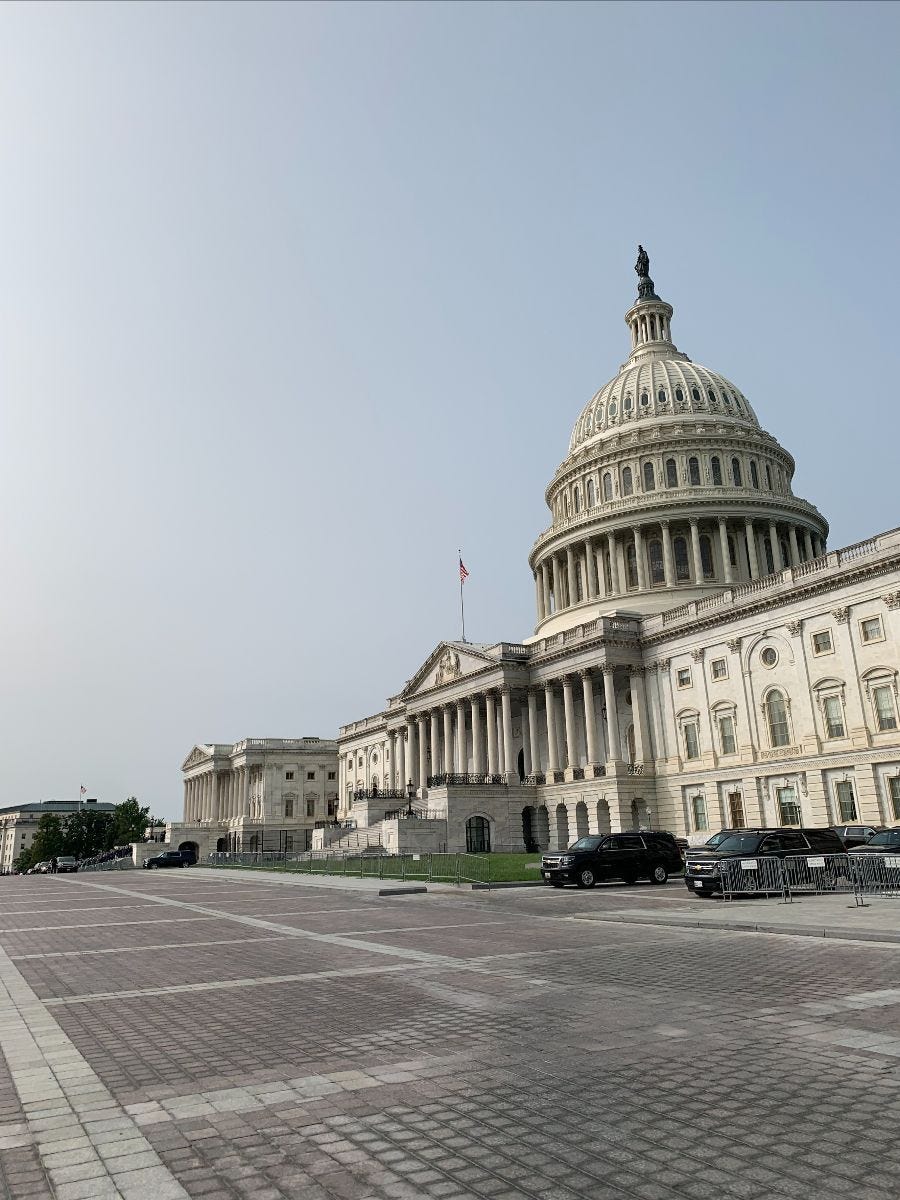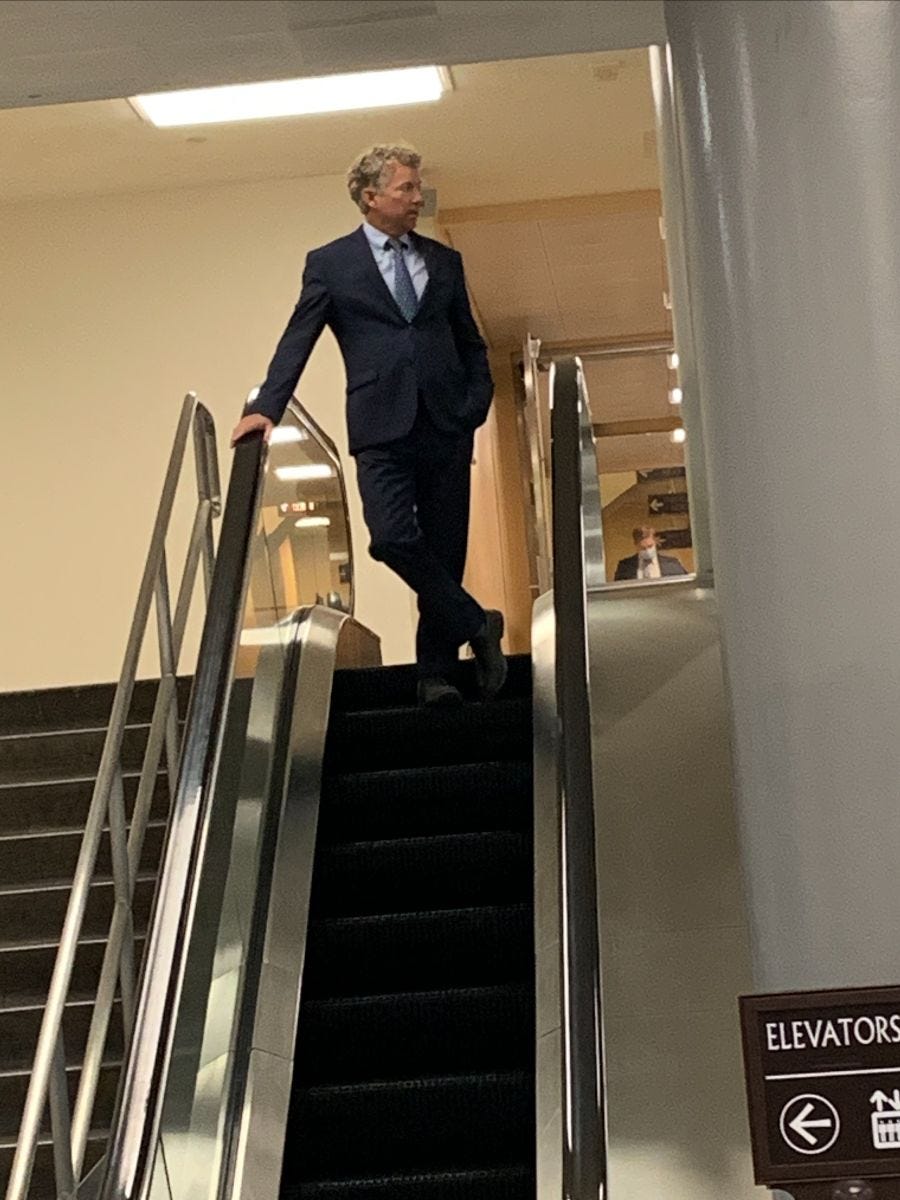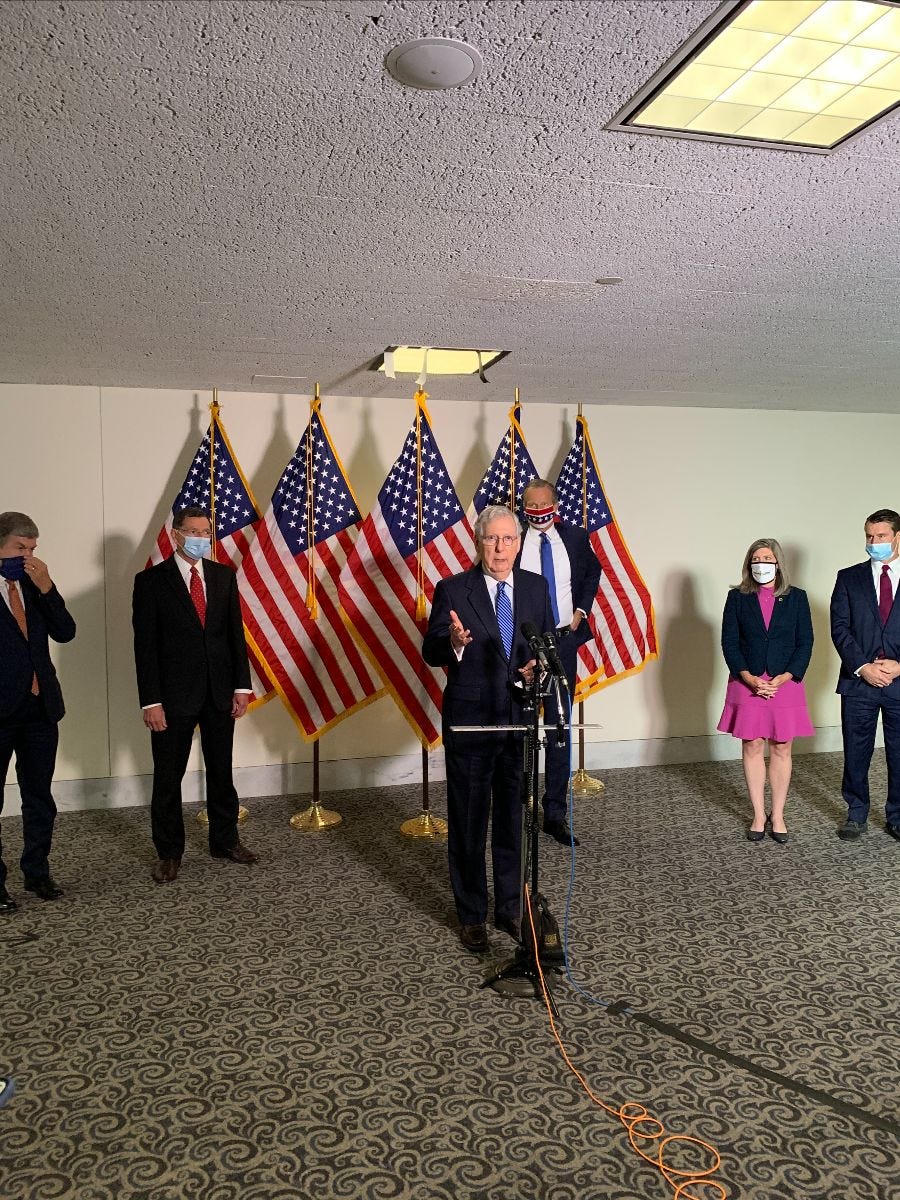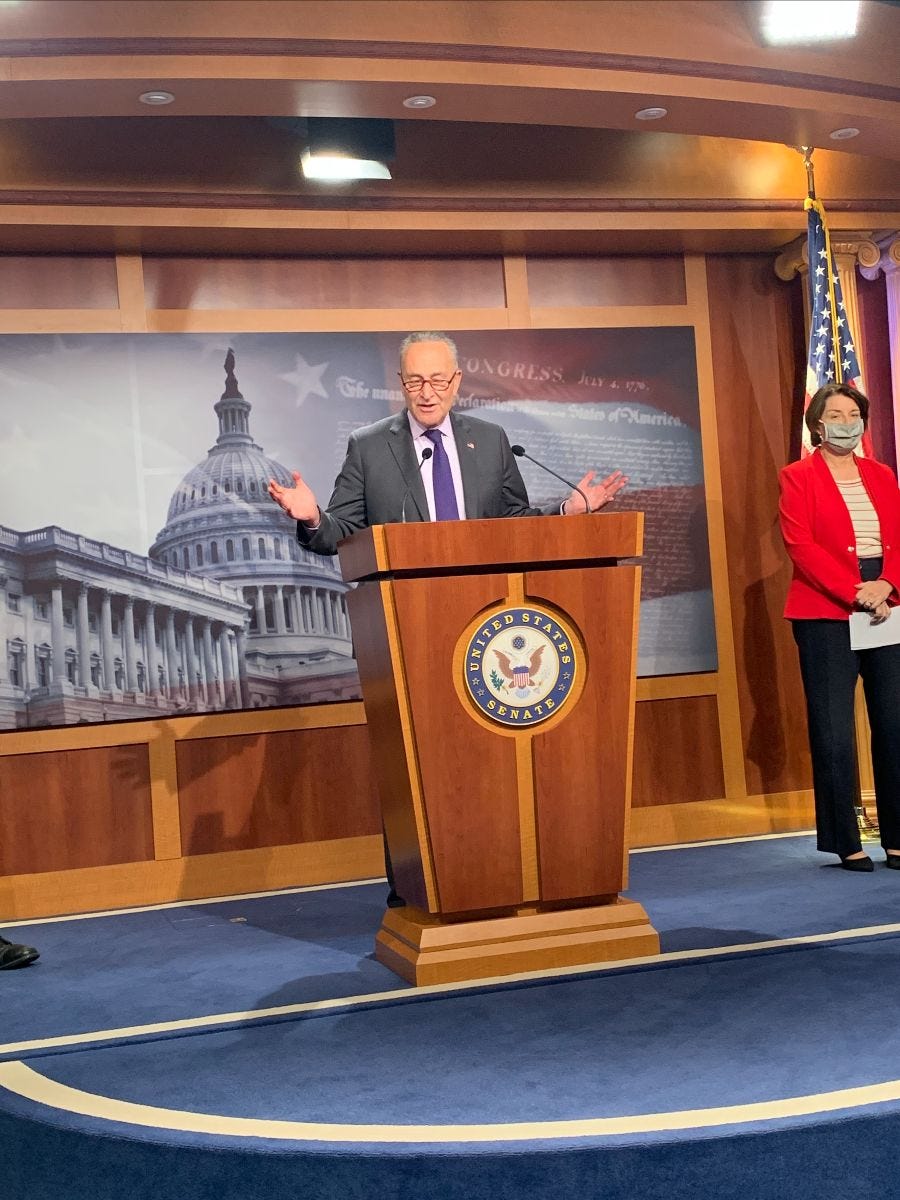Wake Up To Politics - September 16, 2020
Wake Up To Politics: September 16, 2020
Good morning! It’s Wednesday, September 16, 2020. Election Day is 48 days away. The first presidential debate is 13 days away. Have questions, comments, or tips? Email me.
Leading today’s newsletter: My first dispatch from Capitol Hill! I spent yesterday running around the Capitol — this will be the first in a semi-regular feature offering my observations and insights to take you behind the scenes of what’s happening in the halls of power in DC.
Coronavirus is Raging. Congress Has Moved On.
WASHINGTON — More than 13 million Americans are unemployed. Almost 200,000 have died of COVID-19. And 36,000 were diagnosed with the virus just on Tuesday.
But on Capitol Hill throughout the day, lawmakers were talking about anything else.
When I arrived in the morning, two competing spectacles were taking place outside the building: a large press conference where House Republicans unveiled their election-year agenda, and an event with comedian Jon Stewart focused on veterans affected by burn pits.
Both events featured masks and social distancing, but neither dwelled on the ongoing pandemic. (McCarthy promised that Republicans would “defeat the coronavirus and keep America healthy” if given the House majority, although he did not offer any details to explain how.)
On the floor of both chambers that day, Congress’ focus was also far from coronavirus: on the Senate side, Majority Leader Mitch McConnell (R-KY) was ushering three more district court judges to confirmation, while the House was voting on a bill to promote diversity in public schools.
The best place to catch senators, I was told, is at the Senate subway, where reporters camp out as lawmakers shuttle to and from their offices before and after casting votes. The Capitol is wildly accessible: no senator can get to the floor without crossing by the crush of journalists, and many assent to quick hallway interviews before the elevator doors close to whisk them to the chamber. (The challenge for me, then, was making sure I could recognize who was who. Even for someone who has spent their fair share of time watching C-SPAN, telling the senators apart from behind their masks wasn’t always easy.) Many walked with aides trailing close behind, holding out taping devices of their own to ensure no word from the boss went unrecorded.
I surveyed the legislators I could find about whether they felt optimistic another coronavirus stimulus package was in the offing. The last package passed in April, and negotiations have stalled since then on another bill to provide aid to Americans. House Democrats approved a $3 trillion bill in May, but only one Republican supported it; Senate Republicans offered a $300 billion measure, but no Democrats backed it.
“I think it’s probably under a 50-50 chance” that an agreement is struck before the election, Sen. Tammy Baldwin (D-WI) told me.
“It doesn’t look very promising,” Sen. Josh Hawley (R-MO) agreed.
Most of the lawmakers I interviewed agreed that a compromise was looking unlikely, but they predictably differed on who to blame for the impasse. “It’s up to [Democrats] to come to the table,” Sen. Marsha Blackburn (R-TN) told me. But Baldwin took a different view: “The administration walked away from the table,” she claimed.
Members of each party blamed the other for putting forward a one-sided proposal and refusing to negotiate further, even as they both engaged in the same gambit. “I think [Americans] should be very irritated,” Hawley told me of the lack of a bipartisan compromise.
And then, back to form: “They should be particularly irritated the Democrats won’t at least allow us to have a process.”
Almost all of the lawmakers I saw were wearing masks, with one exception: “I already had it. I’m immune,” Sen. Rand Paul (R-KY) told me when I asked why he wasn’t wearing one, despite the Capitol’s safety protocols. Asked about instances where individuals have been re-infected with the virus, Paul (an ophthalmologist by training) said he was unconcerned. “There are three cases out of 25 million...and they had no symptoms.” (There have been 29 million global cases of coronavirus; one of the three cases of re-infection has reported symptoms.)
Once most of the senators had trekked back to their offices after casting their first votes for the day — the federal judiciary newly expanded — I checked in on the mostly-empty Senate floor. I was the sole reporter watching from the Press Gallery at the time (all of the action happens in the hallways), accompanied only by a short stack of books that included Robert Caro’s “Master of the Senate.”
The topic on the floor was not coronavirus, but the fate of the Senate itself — specifically, the fate of the legislative filibuster. Sens. Dick Durbin (D-IL), John Thune (R-SD), and Lisa Murkowski (R-AK) were going back and forth on the merits of the longtime legislative tool. “I think the Senate needs to change,” Durbin declared; ending the filibuster would be akin to “blowing up the Senate,” Thune shot back.
They weren’t delivering monologues, as I had expected. Instead, they were politely taking turns, responding to each other’s points. “We are coming dangerously close to debating on the floor of the Senate,” Durbin joked. “It almost never happens, and we are coming close to it.” (Don’t worry, I thought. No one else saw.)
The main event of a Tuesday at the Capitol is the Senate caucus lunches, when both parties split off to break bread and plot strategy. All six members of the Senate Republican leadership spoke to reporters after the lunch; each came with their own pet topic to hold forth on. McConnell opened with a discussion of “blue slips,” a courtesy relating to judicial nominations he has mostly ended; Thune returned to the filibuster; Sen. Joni Ernst (R-IA) spoke about the derecho hitting her state.
The ongoing pandemic and resulting economic downturn went largely unmentioned. “I want to start off by making a few observations about something that’s probably not at the top of your agenda at the moment,” McConnell began, almost apologetically, as he launched into a discourse on a fairly obscure process issue.
After the press conference came to a close, I asked Sen. Roy Blunt (R-MO), the fourth-ranking member of the leadership, if the Senate planned to stay in session until a coronavirus relief deal is struck, as Speaker Nancy Pelosi (D-CA) had pledged on the House side earlier in the day. He wouldn’t say. But “there’s a deal to be had,” he promised, adding that he liked a bipartisan proposal from the House Problem Solvers Caucus “on first look.” (A group of centrist rank-and-file lawmakers had released a $2 trillion bill earlier Tuesday, which would be quickly rejected by Pelosi, to the frustration of some of her members.)
Ultimately, Blunt said — repeating the same talking points I heard his colleagues offer earlier — the onus laid with the Democrats.
So I went over to the Democratic press conference, where coronavirus was also far from top-of-mind. Again, each senator came with a prepared statement on one issue or another. Senate Minority Leader Chuck Schumer (D-NY) began by sounding off on climate change, then Sen. Amy Klobuchar (D-MN) on election security, and Sen. Jeff Merkley (D-OR) on wildfires.
I asked Schumer about the coronavirus relief talks, and gave him the same question about whether the Senate would stay in session until striking a deal. “You’d have to ask Sen. McConnell.” (I tried.) “We have to have the president meet us in the middle,” he told me, a line he offered repeatedly throughout the press conference without defining where “the middle” was.
When a reporter asked him to “please be a little more specific” about the dollar amount he was referring to, Schumer said “we came down a trillion” and “they should go up a trillion.”
“But that’s not the middle,” the reporter protested. Frustrated as questions on the aid package mounted, Schumer moved on, and soon ended the press conference altogether.
Another day had gone by, and Democrats and Republicans were far as ever from a coronavirus compromise. “Problem unsolved,” more than a few reporters snarked on Twitter, referencing the group that had tried to broker a deal. Instead, lawmakers urged reporters to focus on a dizzying array of other stories, from climate change to the future of the filibuster. As far as I could tell, no negotiations on any of them took place throughout the day.
Trump town hall: “President Donald Trump claimed on Tuesday to have ‘up-played’ the threat of coronavirus early in the pandemic, contradicting his own remarks to the journalist Bob Woodward that he wanted to minimize the disease to avoid panic.”
“Speaking at an ABC News town hall moderated by George Stephanopoulos, Trump rebutted a student who asked why he had downplayed ‘a pandemic that is known to disproportionately harm low-income families and minority communities.’ Trump defended his response to the health crisis by citing an early travel ban on foreign nationals from China from entering the U.S. in order to curb the spread of the virus.” (Politico)
Bolton investigation: “The Justice Department has opened a criminal investigation into whether President Trump’s former national security adviser John R. Bolton unlawfully disclosed classified information in a memoir this summer, an inquiry that the department began after it failed to stop the book’s publication, according to three people familiar with the matter.”
“The department has convened a grand jury, which issued a subpoena for communications records from Simon & Schuster, the publisher of Mr. Bolton’s memoir, ‘The Room Where It Happened’ The Javelin Agency, which represents Mr. Bolton, also received a subpoena, according to a person familiar with the investigation.” (New York Times)
Vaccine plan: “The federal government outlined a sweeping plan Wednesday to make vaccines for COVID-19 available for free to all Americans, even as polls show a strong undercurrent of skepticism rippling across the land.”
“In a report to Congress and an accompanying ‘playbook’ for states and localities, federal health agencies and the Defense Department sketched out complex plans for a vaccination campaign to begin gradually in January or possibly later this year, eventually ramping up to reach any American who wants a shot. The Pentagon is involved with the distribution of vaccines, but civilian health workers will be the ones giving shots.” (Associated Press)
All times Eastern.
President Donald Trump will participate in a call with Jewish leaders to mark the High Holy Days at 12:30 p.m., have lunch with Vice President Mike Pence at 1:30 p.m., and deliver remarks at a National Republican Congressional Committee (NRCC) fundraiser at 7 p.m.
Vice President Mike Pence will travel to Zanesville, Ohio. He will host a “Workers for Trump” campaign event at the Muskingum County Fairgrounds at 5:30 p.m.
The Senate will convene at 10 a.m. The chamber will consider four district judge nominations: Todd Wallace Robinson (Southern District of California), David Dugan (Southern District of Illinois), Stephen McGlynn (Southern District of Illinois), and Iain Johnston (Northern District of Illinois).
The Senate will vote to confirm Robinson and advance Dugan and McGlynn at 11:30 a.m., then vote to confirm Dugan and McGlynn and advance Johnston at 3 p.m.
The House will convene at 9 a.m. and consider ten pieces of legislation:
H.R. 2574 – Equity and Inclusion Enforcement Act of 2019
H.R. 7909 – Ensuring Children and Child Care Workers Are Safe Act of 2020, as amended
S. 2683 – Child Care Protection Improvement Act of 2020, as amended
H.R. 3659 – Danny’s Law, as amended
H.R. 8162 – 21st Century Community Learning Centers Coronavirus Relief Act of 2020, as amended
S. 881 – PROSWIFT Act
H.R. 4979 – Rural STEM Education Act, as amended
H.R. 4990 – Election Technology Research Act of 2020, as amended
The Supreme Court is on summer recess.
Democratic presidential nominee Joe Biden will receive a briefing from public health experts in Wilmington, Delaware, on a COVID-19 vaccine. Then, at 2:30 p.m., he will deliver remarks on “developing and equitably distributing a safe and effective COVID-19 vaccine.”
Democratic vice presidential nominee Kamala Harris has no public events scheduled.
Thanks for reading! If you enjoy Wake Up To Politics, please consider donating to support me and my work, listening to my podcast with St. Louis Public Radio, and spreading the word about the newsletter to your friends and family. If this newsletter was forwarded to you, go to wakeuptopolitics.com to subscribe and learn more.



